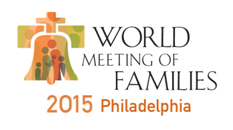 With all the questions native Philadelphians might have about the arrival of Pope Francis, visitors coming from outside the country have even more to plan than a few extra traffic delays.
With all the questions native Philadelphians might have about the arrival of Pope Francis, visitors coming from outside the country have even more to plan than a few extra traffic delays.
Citizens from 135 countries are expected to come to Philadelphia for the World Meeting of Families on Sept. 22-25, and the papal visit on Sept. 26-27. To come into the country, however, a visa may be needed in order to ensure that the visitors can come to the United States as safely and efficiently as possible, and legally.
Visas are needed for a majority of countries that visitors may be traveling from, with the exception of Canada and Europe, or any other country with which the United States has an agreement.
[hotblock]
Yago De la Cierva, a member of the Visa and Immigration Committee of the World Meeting of Families, spoke about the services that his committee will provide to foreigners during the World Meeting.
“We provide a letter of invitation that is used to ask for a visa to come to the United States,” De la Cierva said. “We are not creating a special way to get a visa, but are supporting visitors through the application process.
“The World Meeting of Families doesn’t interfere with the consulate or embassy for those people wishing to visit the United States, so it is up to these organizations to decide how long the visa lasts, anywhere from 30 to 90 days. Lawyers in the area are helping these people right from the very beginning so that there will be no need for specific, personal help later on in the process — legal language can be difficult for foreigners.”
De la Cierva has previously served as the executive director of World Youth Day in Madrid, Spain, in 2011, and so he has significant experience in coordinating large-scale, international church events. He was also named as a lay member of the Pontifical Council for the Laity by Pope Francis in 2014, and teaches “Event Organization” and “Communication in Church Events” at Universidad Rey Juan Carlos in Madrid.
“This is a very international event. Though it is organized locally by the Archdiocese of Philadelphia, it is much bigger than that and requires planning with the Vatican,” De la Cierva said. “Certain conditions by the Vatican require that the local communities help people to obtain visas to come, and we are required to support at least a couple people from every country in the world.”
Such international travel would include two or more people who are active in the Catholic community of their city or country. These visitors are nominated by their archdiocese or diocese to attend the World Meeting of Families congress.
“Archbishop Chaput has really been generous in supporting these visitors,” De la Cierva said. “He’s found money to help families from other countries attend that would not be able to come otherwise.”
The 17 members of the Visa and Immigration Committee of the World Meeting of Families have also arranged additional support for international visitors.
“We have contacted and asked certain (ethnic or language) groups in Philadelphia through the archdiocese to help with the World Meeting of Families, and have received offers from these local communities — such as people from Nigeria, Vietnam and Italy — to help with translating and guiding people around the city,” De la Cierva said. “We also offer the option (to international visitors) of staying with a family in Philadelphia who shares the same heritage or language. Staying (with) a family makes the whole experience rich.”
Translation services can be provided by the Visa and Immigration Committee, though most of the families’ congress will be translated into other languages. The committee also is helping with translations of visa documents to enable a smooth application process for visitors requiring a visa.
“We think of organizing this like it’s a family business,” De la Cierva said. “Everyone (visiting) is considered as the family of others.”
PREVIOUS: Mobile app helps volunteers stay sharp for World Meeting
NEXT: Catholic world’s most-sought speakers lined up for World Meeting



Share this story